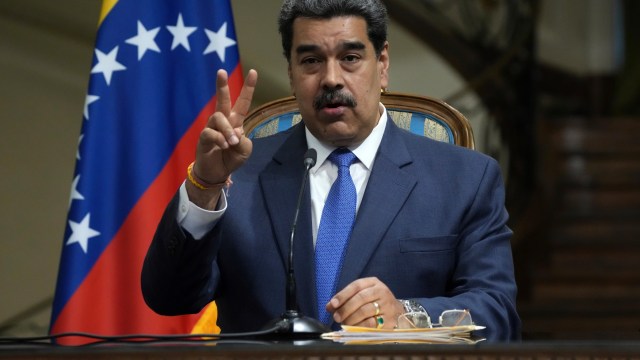
Venezuela’s dictator, Nicolás Maduro, is celebrating like never before. Suddenly and sadly the international community seemed to have forgotten his crimes against humanity, the shady deals with Russia and Irán, as well as a long list of violations of human rights.
By The Hill – Arturo McFields Yescas
The Venezuela regime and the Unitary Platform of the opposition have resume conversation after a hiatus of more than a year. Following Nov. 26 conversations, some sanctions have been eased, $3 billion were unfrozen and green light for oil operations with Chevron are moving forward. The deal will be managed by the United Nations. In exchange for all this, the regime promised to continue the dialogue – nothing more.
Although the fine print of the agreement says that the United Nations will help ensure the good handling of funds to be allocated in health, education, energy, food security and natural disasters programs, Maduro has never respected any type of international arbitration, especially when it comes to Venezuela’s “sovereign money.”
How did the international community fall into this trap?
Let’s see. In January 2019, the National Assembly of Venezuela declared Juan Guaidó as interim president of the nation. The decision was encouraging and had the overwhelming support of the democracies of more than 50 nations around the world. In 2020 the pandemic arrived, then the political configuration of the Latin América changed and in 2022 war ensued when Russia invaded Ukraine. The number of Venezuelan migrants reached a record high, going from 4 million to 7 million. Despite the international recognition of another president, Maduro maintains his authoritarian grip on power and political prisoners continue to rot in the regime’s jails.
Dialogue without leadership and lack of real pressure
Corina Machado, coordinator of the Vente Venezuela movement and one of the most critical voices against the dictatorship, has made it clear Maduro does not want dialogue but rather to squeeze money from the international community. “What can come out of a ‘negotiating’ table that, in fact, is just an extortion table? A good cut for each of those participating, including the UN. Who represents the Venezuelans there? No one. What do people get? Nothing,” Machado said.
Colombia is a not a right mediator
The Colombian government, which has not had the courage nor the commitment to condemn the crimes against humanity in Venezuela, is not an ideal mediator but rather an ideologized actor. The Colombian government has said that taking the Maduro’s regime before the International Criminal Court (ICC) is a mistake. Colombian President Gustavo Petro himself has proposed that the sanctions against the dictatorship be fully eliminated, offering a total amnesty in Venezuela and proposing a coexistence pact during and after the elections. In other words, total impunity.
México’s president has become the “Mariachi” of dictators
The government of Andrés Manuel López Obrador (AMLO) in Mexico lacks the slightest credentials to promote democracy and human rights. Obrador has defended the dictatorships of Cuba, Nicaragua and Venezuela without shame or embarrassment, and he even tried to sabotage the last Summit of the Americas because the dictatorships mentioned above were not invited to the meeting of hemispheric democracies. The head of state of México has never used his voice to condemn the violations of human rights in Venezuela, nor has condemned the abuses of the criminal regimes of Nicaragua and Cuba. Never.
Migrants must be part of the dialogue
An effective and real dialogue is not possible unless we take into account migrants. They are key on the equation. It must be guaranteed that the 7 million Venezuelan migrants can have the right to vote, and receive the essential documents to exercise this and other elementary rights, including passports or any other official identification document, which today they do not have. Consideration should be given, and it is right to do so, to invite at the dialogue table other countries receiving thousands of Venezuelan migrants, such as Ecuador, Chile and Brazil. These and other countries have paid a huge price for the crisis.
Inconsistency or pragmatism
While Maduro continues to make shady deals with Irán and is also being wanted by the U.S. government for drug trafficking, the regime is receiving a royal treatment that confuses allies and motivates other dictators to follow Venezuela footsteps. The international community cannot defend democracy and do pragmatic business with oil dictatorships. It can’t be done. Temporary good oil deals will end up undermining credibility and leadership in the hemisphere.
Is not too late. Even though the dictator seems to have won, strong international pressure still can be taken pushing the regime to open doors for international human rights organizations, releasing of political prisoners and ensuring the end of the savage ecocide caused by the blood gold business. The greatest democracy in the world has to assume the greatest leadership and never lower its highest principles. Now is the right time.
…
Read More: The Hill – In Venezuela’s agreement, democracy should be first – not oil profits
…

